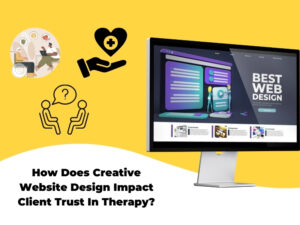How Does Creative Website Design Impact Client Trust In Therapy?

In today’s digital world, having a well-designed website is not just a luxury—it’s a necessity. For therapists, a professional online presence can significantly influence how clients perceive their services. Trust is paramount in therapy, and the design of a website plays a significant role in building or eroding that trust. But how exactly does creative website design impact client trust in therapy? Let’s dive in.
Why is website design crucial for building client trust in therapy?
The design of a therapy website sets the tone for potential clients’ expectations. A visually appealing, user-friendly site speaks volumes about a therapist’s professionalism and attention to detail. A cluttered or outdated website, on the other hand, can leave clients feeling uncertain and wary.
First impressions matter, and for many clients, their first interaction with a therapist may come through a website. An intuitive design that clearly communicates services, credentials, and contact information helps clients feel more confident in their decision-making process. The goal is to create a website that is easy to navigate and reflects the therapist’s values and expertise.
How does creative website design influence first impressions?
The first impression of a therapist’s website can either make or break a potential client’s trust. Creative website design plays a key role in this.
- Appeal and aesthetics: Clean, modern designs that incorporate soothing colours can create an inviting atmosphere for therapy clients.
- Clarity and simplicity: A well-organised layout that highlights key information, such as services, therapist qualifications, and client testimonials, makes it easier for clients to find what they need.
- Professional images and branding: High-quality images and consistent branding can make a website feel more trustworthy, showcasing the therapist as a professional in their field.
Can a well-designed website improve the perception of professionalism in therapy?
A well-designed website is an extension of a therapist’s professionalism. When a potential client visits a site that looks polished and easy to navigate, it boosts the perception of credibility and expertise.
- Brand consistency: Using consistent fonts, colours, and logos across the website helps reinforce a professional image.
- Professional content: Clear, well-written content about therapy services, qualifications, and testimonials can establish trust and provide a sense of reliability.
- Showcasing accreditations: Displaying relevant certifications or memberships in professional bodies can further establish authority and professionalism.

What role does user-friendly navigation play in enhancing trust?
For therapy clients, ease of use on a website can directly correlate with trust. A website that’s difficult to navigate or lacks clear directions can cause frustration, leaving clients uncertain about the therapist’s professionalism.
- Simple menus and clear structure: Easy-to-find menus and intuitive page layouts allow clients to navigate without confusion.
- Quick access to important information: Clients can quickly locate your contact details, services, or FAQs, which helps build confidence in your ability to address their needs.
- Fast load time: A website that loads quickly provides a smooth experience, showing that you value your clients’ time.
- Easy Booking Process: A seamless appointment scheduling system or clear booking instructions make it easy for potential clients to take the next step.
How does creative website design help convey a therapist’s expertise and approach?
A website can be a powerful tool to convey a therapist’s approach and expertise. With creative design elements, therapists can visually communicate their values, specialisations, and treatment styles.
- About page design: The About page should highlight the therapist’s experience, specialisations, and approach to therapy in an approachable and informative way.
- Blog or articles section: A regularly updated blog with helpful articles can showcase a therapist’s knowledge and willingness to educate clients. It also provides value to potential clients seeking insights on mental health, therapy, or related topics.
- Client testimonials and case studies: Including genuine client testimonials or case studies on the website can give potential clients confidence in the therapist’s ability to help them.
Why is a secure and mobile-friendly website important for therapy clients?
In today’s world, website security and mobile-friendliness are no longer optional; they are vital to client trust and satisfaction.
- Website security: Having an SSL certificate and secure payment gateways ensures that clients’ personal and payment information is protected. A secure website reassures clients that their privacy is respected.
- Mobile-friendly design: With more people using smartphones to search for services, a mobile-friendly website is essential. A mobile-responsive design ensures that clients can access your website easily from any device, increasing trust and accessibility.

Can SEO-optimised websites increase client confidence in therapy services?
Search engine optimisation (SEO) may seem technical, but it plays a crucial role in building trust. A website that appears at the top of search results is more likely to be perceived as reputable.
- Higher visibility: Ranking high on Google signals to potential clients that you are a trusted expert in your field.
- Local SEO: Optimising for local searches ensures clients in your area can easily find your services, increasing trust.
- Relevance of content: SEO ensures your content answers client questions and aligns with their search, making it more trustworthy.
- Trustworthy resources: A well-optimised website with valuable content positions you as a trusted authority in your field.
How can creative website design influence client retention and referrals in therapy?
A well-designed website for therapists doesn’t just attract clients—it helps retain them and encourages referrals.
- Easy access to services: Providing clear, accessible options for booking appointments or accessing resources ensures clients can easily interact with your services.
- Client portal features: Offering features like client portals for progress tracking or scheduling can keep clients engaged and coming back.
- Referral programs: A thoughtfully designed website can promote referral programs or share client success stories, encouraging existing clients to refer friends and family.
Trust through design
Creative website design is more than just an aesthetic choice; it’s an essential part of building trust with potential clients in the therapy field. A well-designed website can help establish your professionalism, convey your expertise, and create a seamless, positive experience for your clients. By choosing the best website builder for therapists, you ensure that when you get the design right, your clients will feel more confident in your services, leading to stronger relationships, better retention, and increased referrals.
If you’re looking to enhance your therapy practice’s online presence, Nifty Websites Australia specialises in creating user-friendly, SEO-optimised websites for Australian businesses. Our team of experts provides web design, development, SEO services, and more, all tailored to your business needs. Let Nifty Websites Australia help you build a website that fosters trust and connects you with your clients.
